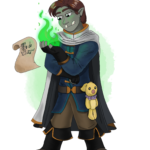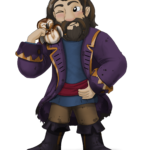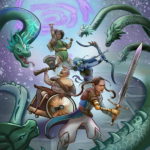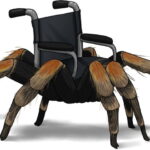Eldris Moonbow
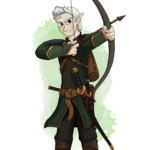
Eldris Moonbow (Ranger)
Medium Humanoid (Elf), Neutral Good
Cisgender Man (He/Him)
Armor Class: 17
Hit Points: 170
Speed: 35 ft.
| Strength | Dexterity | Constitution | Intelligence | Wisdom | Charisma |
| 10 (+0) | 20 (+5) | 18 (+4) | 16 (+3) | 14 (+2) | 10 (+0) |
Skills: History +8, Investigation +8, Nature +8, Perception +7, Persuasion +5, Sleight of Hand +5, Stealth +10
Senses: Darkvision 60 ft., Passive Perception 17
Languages: Celestial, Common, Draconic, Elvish, Giant
Challenge: 15
Abilities
Spellcasting. Eldris is a 15th-level spellcaster. His spellcasting ability is Wisdom (spell save DC 15, +7 to hit with spell attacks). He has the following Ranger spells prepared:
1st Level (4 slots): Alarm, Cure Wounds
2nd Level (3 slots): Find Traps, Locate Animals or Plants, Pass Without Trace, Spike Growth
3rd Level (3 slots): Speak with Plants, Water Breathing
4th Level (2 slots): Locate Creature
Colossus Slayer. Once per turn, when he hits a creature with a weapon attack, the creature takes an extra 1d8 damage if it’s below its HP maximum.
Elf Weapon Training. He has proficiency with the longsword, shortsword, shortbow, and longbow.
Escape the Horde. Opportunity attacks against him are made with disadvantage.
Evasion. When he is subjected to an effect that allows him to make a Dexterity saving throw to take only half damage, he instead takes no damage if he succeeds on the saving throw, and only half damage if he fails.
Favored Enemy: Beasts, Giant, Fiends, Celestial, Dragons. He has advantage on Survival checks to track his favored enemies, as well as on Intelligence checks to recall information about them. He also learns one language of his choice that is spoken by his favored enemies, if they speak one at all.
Fey Ancestry. He has advantage on saves against being charmed, and magic can’t put him to sleep.
Fighting Style: Defense. While he is wearing armor, he gains a +1 bonus to Armor Class.
Hide in Plain Sight. He can spend 1 minute creating camouflage for himself from naturally occurring materials. Once he is camouflaged, he can try to hide by pressing himself up against a solid surface to gain a +10 bonus to Stealth checks as long as he remains there without moving or taking actions.
Land’s Stride. Moving through nonmagical difficult terrain costs him no extra movement and he can also pass through nonmagical plants without being slowed by them and without taking damage from them. He has advantage on saving throws against plants that are magically created or manipulated to impede movement.
Mask of the Wild. He can attempt to hide even when he is only lightly obscured.
Natural Explorer: Forest, Grassland, Mountain. He has a favored terrain type. His proficiency bonus is doubled for proficient skills when he makes an Intelligence or Wisdom check related to it. While traveling for an hour or more in his chosen terrain, difficult terrain doesn’t slow his group’s travel, his group can’t become lost except by magical means, he remain alert to danger even when he are engaged in another activity, he can move stealthily at a normal pace (while alone), he find twice as much food while foraging, and while tracking creatures, he learn the exact number, sizes, and how long ago they passed through the area.
Primeval Awareness. As an action, he can expend one ranger spell slot (1 minute per level of spell slot) to sense whether any aberrations, celestials, dragons, elementals, fey, fiends, or undead are present within 1 mile of him (or within up to 6 miles if he is in his favored terrain). This feature doesn’t reveal the creatures’ location or number.
Trance. He doesn’t need to sleep, but meditates semi consciously for 4 hours a day. While meditating, he can dream after a fashion; such dreams are actually mental exercises that have become reflexive through years of practice. After resting in this way, he gains the same benefit that a human does from 8 hours of sleep.
Vanish. He can use the Hide action as a bonus action on his turn. Also, he can’t be tracked by nonmagical means, unless he chooses to leave a trail.
Volley. He can use his action to make a ranged attack against any number of creatures within 10 feet of a point he can see within his weapon’s range. He must have ammunition for each target, as normal, and he makes a separate attack roll for each target.
Traits
Executive Functioning [IE 3, Chronic]. Eldris has trouble organizing himself, including his thoughts, his possessions, his emotions, his time, and his memory. He has a −3 penalty to all initiative rolls, and on an initiative roll of 1 or less (or a natural 1), he cannot use his action or bonus action for the first round due to indecision, but he can still use his reaction. Eldris has a −3 penalty on his passive Wisdom (Perception) to determine surprise, and if the plans for the day change, he must succeed on a DC 11 Constitution saving throw or have disadvantage on all Wisdom and Charisma checks for 3d4 minutes while he mentally adapts to his new circumstances and plans. On any attempt to find something that Eldris previously possessed, he has a −3 penalty on Wisdom (Perception) checks to find it. He has a −3 penalty on all reaction rolls. Because Eldris is used to having to compensate for his decision-making, he has developed creativity and resilience, so once per day, when making a non-combat ability check, he can choose to do so with advantage. Multiple days in a row with high stress or demands can temporarily increase the IE.
Actions
Extra Attack. He can attack twice whenever he takes the Attack action on his turn.
Katana. Melee Weapon Attack: +10 to hit, reach 5 ft., one target. Hit: 8 (1d6 + 5) slashing damage.
Longbow. Ranged Weapon Attack: +10 to hit, range 150ft/600ft, one target. Hit: 9 (1d8 + 5) piercing damage.
Assistive Devices
Armor (any armor), common
This armor’s temperature changes in the presence of strong emotions. While wearing this armor, you become colder if any creature within 60 feet is feeling a strong hostile, angry, embarrassed, afraid, or other stressful emotions and warmer when within 60 feet of strong excitement, bliss, or other happy emotions, the temperature reflecting the intensity of the emotions. If more than one creature with different emotions is within range, the armor temperature rapidly fluctuates. The armor is immune to Heat Metal and other spells that influence material temperature, and if all creatures within range are experiencing similar emotions, you have resistance to fire or cold damage as applicable. If the temperature is fluctuating, you have disadvantage on concentration saving throws and Wisdom (Insight) checks until the fluctuations stop.
Background
As a wood elf, Eldris was raised in an ideal environment for one born with high functioning developmental differences. He never quite fit in with the other youths he grew up with, but elves are already a little different by nature, so it wasn’t a terrible experience. Only when he ventured into the world of humans did he begin to fully understand his differences, which led him to seek out and eventually find his magic armor. He commissioned the armor and felt that he was able to continue his adventures in the world. Eldris enjoys spending time in nature where he can hunt and track his favored enemies. This helps him experience his emotions in a safe environment for him.
Personality
Eldris is quiet, and reserved. He has trouble collecting his thoughts and being able to communicate them to others. Due to that, he does not like to meet new people. He is often perceived as being arrogant or standoffish. Eldris has a strong sense of compassion and justice. He loves to take care of those who are unable to take care of themselves. Even though he does not enjoy being around others, he wants to make their lives better in any way he can. He prefers to work silently and help from the shadows.
Plot Hooks
- Adventurers may seek Eldris’ help to track down a specific enemy that he is trained in.
- Adventurers may run into Eldris in a mountainous area and help with one of his assignments.
- Adventurers may hire Eldris to fight alongside him in a large battle that is about to happen in a town nearby.
